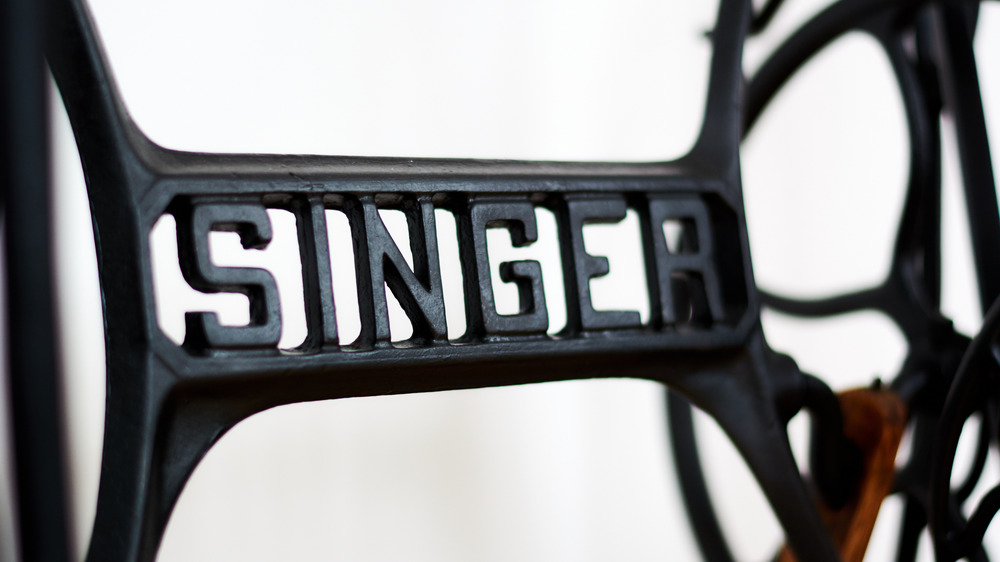The Mystery Of Daisy Alexander's Message In A Bottle
It sounds like the beginning of a feel-good, formulaic Hollywood movie. The year was 1949, according to The Museum of Hoaxes. Restaurant worker Jack J. Wurm was walking along the beach near San Francisco when he noticed a bottle floating in the surf with a bit of paper tucked inside. Upon opening it, as Ripley's Believe It or Not reported, he discovered a message, but it wasn't just someone saying hello. It read: To avoid all confusion I leave my entire estate to the lucky person who finds this bottle and to my attorney, Barry Cohen, share and share alike. Daisy Alexander — June 20, 1937. Assuming this was a prank, Wurm saved the bottle and message anyway and mentioned it in passing at a party three months later.
Lo and behold, a fellow partygoer was a soldier who had just returned from England and recognized the name Daisy Alexander. Alexander was the daughter of Isaac Singer, the extremely wealthy founder of the Singer Sewing Machine Company. Furthermore, he thought Alexander had died in 1940 at the age of 80 from "bomb shock" due to World War II bombings, with no descendants and no will.
Wurm sent a letter to the London postmaster and asked him to forward correspondence to Alexander's lawyer, Barry Cohen. And keeping up with the Hollywood movie vibe, this actually worked. Cohen confirmed that the message in the bottle seemed to be legit, and Wurm was due half of Alexander's estate — a cool $6 million.
A will in a bottle?
Wurm's incredible story got nationwide press. The Brooklyn Daily Eagle ran an article on July 27, 1949, noting that the only Daisy Alexander will that could be found was over 40 years old, whereas the paper in the bottle was dated June 20, 1937. They also noted that Wurm lived in a "small cabin south of Palo Alto" with his wife, Agnes. In addition to working in a restaurant, Wurm enjoyed singing in a barbershop quartet in his spare time. They quoted Wurm as saying, "It's too fantastic to believe the finder of that bottle would share such a fortune, but one can always hope." Unfortunately, Wurm's observation turned out to be eerily prescient.
Per The Museum of Hoaxes, a lot of the story is real. Daisy Alexander was indeed the wealthy daughter of Isaac Singer, although she was not his only child. She actually died on 1939 of seemingly natural causes, and Barry Cohen was her lawyer. As for her will? It existed. But Cohen couldn't find it after she died.
A fruitless, frantic search
A "frantic search" for the will ensued, as reported by The Museum of Hoaxes, and the story of the hunt for the missing will is almost more dramatic than the message in a bottle. It involved a mine detector scanning the walls of Alexander's mansion and a fruitless search for Alexander's pet parrot, who Cohen thought might be able to lead him to the will. A clairvoyant was hired, who "dipped his hands in water, in order to 'magnify the electrical vibrations,' and then ran his hands over various parts of the Alexander mansion," to no avail.
Cohen did respond positively to Wurm's discovery and examined a copy of it, telling reporters that Daisy Alexander had indeed had "a curious interest in floating communications around in a bottle," but also noted that it didn't mean Wurm could inherit the money, even if what he found was authentic. The lack of a witnessed signature meant British courts wouldn't accept it as a legal document. Eventually, Cohen's son Ronald, who took over his practice, announced they were no longer interested in Wurm's claims and that it might be a hoax.
Although there has been quite a bit of speculation as to who might have created the message in the bottle (and why), its true origin was never discovered. Alexander's estate was finally distributed to her niece and nephew, and Wurm eventually left California and retired to Minnesota, where he died in 1987.


